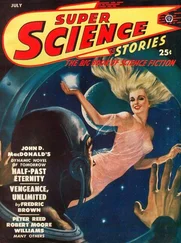The following day he would hang the washing back out, push the carriage out onto the porch, bringing it in at regular intervals, putting it back out. There was a celluloid rattle with a red plastic handle that had to be placed on the front porch steps or on the dirt below the front porch railing.
Steve came into the kitchen, looked over the larder, said, “Kid, you’ll have to go to town tomorrow. We’re getting low.”
Stan felt a deep tremor in his gut. He dreaded the strain of shopping, the strain of keeping from looking behind him as he walked from the car to the store, the strain of keeping the car at a speed of not over thirty-five as Steve had instructed him.
In the evening they had a regular routine. The front-room shades were not drawn, and Stan had to spend a certain amount of time seated in the window, reading. Art and Steve never showed themselves by an unshaded window. All lights had to be out by ten.
Steve moved ponderously around the kitchen, his hands deft and quick. Stan watched him for a moment, and said, “Ham and eggs again?”
Steve straightened up. “Maybe you’d like this job, Ma?”
“No. Go ahead. I’m not bitching.”
When the meal was on the dining-room table, Stan went up and awakened Art. Asleep, Art’s face had settled into flaccid lines, the skin under the stubble of beard looked like a rancid crust on a bowl of grease. When Stan touched him, Art jumped violently, his eyes staring and startled. Then he relaxed, swung his legs over the side of the bed, his face in his hands.
“Shouldn’t sleep during the day. My mouth tastes like the bottom of a dishpan.”
He followed Stan down the stairs. They ate silently and quickly. The coffee was hot, strong and black. Steve hissed out his cigarette in the dregs of his coffee.
“That’s a dirty habit!” Art snapped.
Steve laughed flatly, without humor. “Sensitive, Arthur? Go to hell!”
“I’m going nuts in this place,” Art said petulantly.
Neither of the other two answered him. Stan carried the dishes out to wash them and Art got the cards, brushed the crumbs away and started to shuffle them.
When the dishes were done, Stan watched them for a time, yawning. He went and sat in the lighted front room, turned the light out at nine and went up to bed. He lay in the darkness, thinking of the thin woman who had called. Not bad eyes. Maybe with a little meat on her bones...
Well, there’d be women in Guatemala. Women who would look more than once at a young guy with a hundred thousand U.S. dollars. The memory of the weight of the dead kid in his hands was trying to push its way up out of his subconscious, but he fought it back. Hell, they didn’t have a line on the three of them yet. No, it had been played smart. Careful.
Sleep was black soft water that lapped at him, finally washed over him, carrying him down into a frightening place, a sweaty sickening place...
Suddenly he was wide awake, a cry stifled on his lips. Sweat was cold on his face and he sobbed softly. In the darkness he glanced at the luminous dial on his wristwatch. Only nine-thirty. He had only been asleep twenty minutes. He pounded the pillow into a new shape, tried to relax.
From a distance he heard the drone of voices. Art Marka and Steve Jadisko. He frowned. Usually they were quiet over the rummy game. He wondered what they were talking about. There was no chance of getting down the stairs, because already the new staircase creaked badly.
He was sleeping in his underwear. Silently he rolled out of bed, padded down the hall and into the end bedroom, the one where Steve slept. The dining room was under that bedroom.
He knelt in the dark on the bare floor, stretched out on his belly, and put his ear to the varnished hardwood. When he stopped breathing, he could just make out the words. Steve’s voice: “... but he’s the cover, Art. You can’t do it until we’re ready to haul.”
“I know that. The way I figure it, we stuff him in the furnace and they don’t find the punk until next winter. When he starts to stink, it goes up the chimney. We get all set before we do it. We split his end even.”
Stan got slowly to his feet, went silently down the hall and got into his bed. He lay with his eyes wide open, looking up into the darkness. He did not feel the least bit afraid. Instead he felt a cold wrath. He was the cover. He was the fall guy. Kill him when his usefulness was over.
Oh, fine! Then he felt a deep, excited thrill that ran up his back. They had given him his freedom. The take was in the brown suitcase in the back of Art’s closet. Kill the two of them, take it all and leave. Four hundred thousand sounded a lot better than one hundred. Maybe with four hundred he could stop remembering the dead kid and the picture in the paper where the father was holding up the kid’s mother, where she looked as though she’d slip right down onto the floor if he let go.
Killing them was easy to say, not so easy to do.
He turned on the light. Quarter to ten. He pulled his clothes on, went noisily down the stairs.
“Hi, guys!” he said airily.
“Thought you folded, kid,” Steve said.
“Couldn’t sleep. Thought I’d get myself a drink.” He went on into the kitchen, rinsed out one of the coffee cups, sloshed it half full of rye. The liquor was warm and he almost gagged when he finished the big jolt. But it began to radiate warmth through him, and that was good.
He heard the slap of cards on the maple table, heard Steve say, “Knock with four, sucker. Catch you big?”
“Lemme see. Twenty-eight, thirty-three, thirty-six. Satisfied?”
“That takes care of the first two games, and damn near a schneider on the third.”
Stan forced himself to be calm. The odds were that the kitchen circuit and the dining room were on the same fuse. There was a pinup lamp over the breakfast booth, with a fake parchment shade. He strolled over, out of sight of the card players, pulled the plug out of the wall. With a kitchen knife he quickly unscrewed one of the little brass screws that held the wire tight, wrapped the loose wire around the other post. Then he plugged it back in. There was a crackle, a spit of blue sparks, and both the kitchen and the dining room went dark.
“What the hell?” Art said in a hushed tone, and Stan smiled in the darkness as he heard the fear.
“Nothing. I turned on this lamp out here and I guess it’s shorted. Must have blown the fuse. I’ll take a look. Maybe one of you guys ought to come along. I’m no electrician.”
Steve was the one who joined him. Steve clicked the cellar light on. Stan felt afraid. He hadn’t thought of the cellar light. He had wanted it to be in darkness.
Together they went over to the fuse box, and Steve opened the black metal door. He peered in at the fuses. “Here it is. This one,” Steve said. “You got a penny, kid?”
“Don’t think so.”
“Wait. I got one.” Steve twirled the fuse out, pulled the switch on the side of the box, and the cellar lights went out. Stan heard the clink of the penny, the grating of the fuse being turned back into the socket.
The cellar lights went on. Steve, his hand on the switch, yelled, “Okay up there?”
“Okay,” came Art’s answering yell.
At that moment Stan struck with the kitchen knife. Right under the left shoulder blade. The metal grated on bone and slipped away. Steve grunted in pain and whirled with uncanny speed, his eyes narrowed, his mouth twisted with pain. He reached toward his hip pocket.
Stan grunted with the force of the blow as he blindly stabbed down at Steve’s face. Steve stood perfectly still for a moment, one eye suddenly wide. In the place of the other eye was the dark protruding handle of the paring knife.
As he fell heavily on his side, rolled over onto his back, Stan looked down at him and giggled. Then he made a soft retching sound, turned away, weak with the sudden sickness, his hand against the rough, whitewashed wall. He pulled the switch down.
Читать дальше
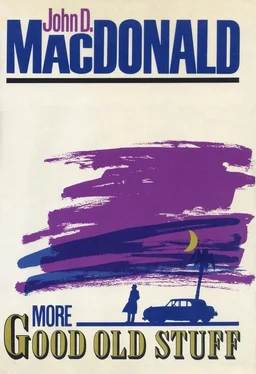
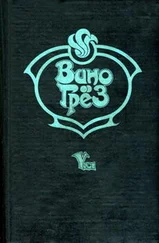
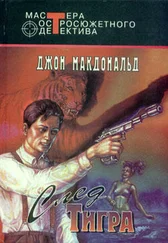
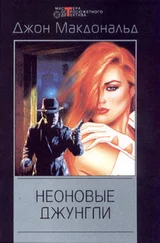
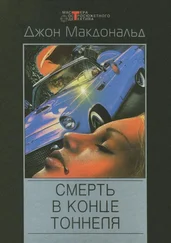
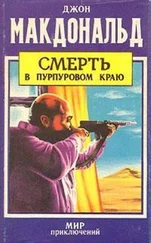



![Джон Макдональд - Wine of the Dreamers [= Planet of the Dreamers]](/books/430039/dzhon-makdonald-wine-of-the-dreamers-planet-of-thumb.webp)

